Wavetronix Click 301 (serial to ethernet converter) (CLK-301) - Quick-reference Guide User Manual
Click 301 serial to ethernet, Installer quick-reference guide, Wire power and communication

Click 301 Serial to Ethernet
INSTALLER QUICK-REFERENCE GUIDE
2
Wire power and communication
If you are using a Click 200 surge protector with the Click 301, power and communication are provided
to the Click 301 through the T-bus (see the Click 200 Quick-reference Guide). If you don’t have a Click 200
surge protector, use the following steps to wire power and communication into the Click 301:
1 Plug a T-bus 5-screw terminal block into the first T-bus connector.
2 Wire DC power (10–30 V) from the power supply into the
first screw terminal on the 5-screw terminal block; wire
-DC into the second screw terminal.
3 Connect RS-485 communication (+485, -485 and GND) to
either the remaining three screw terminals on the 5-screw
terminal block or to the screw terminals in the pluggable
screw terminal block on the top of the Click 301 (see labels
for correct wiring).
The front of the Click 301 has two other communication ports.
˽
DB-9 connector – Connect a straight-through cable here for RS-232 communication
˽
RJ-45 jack – Connect an Ethernet cable here to communicate over an Ethernet network
www.wavetronix.com
801.734.7200
1
Mount the device
The Click 301 mounts over a T-bus for power and communication:
1 If the Click 301 was shipped with the T-bus connector attached,
remove the connector from the module.
2 Snap the connector onto the DIN rail by positioning it over the rail
with the male connector pointing to the right. Hook one arm over
the edge of the DIN rail and press down on the other arm until it
snaps into place.
3 Connect the T-bus connector to the rest of the T-bus by sliding
them together until you hear them snap into place.
4 Mount the Click 301 onto the DIN rail: position it properly over the
T-bus connector, hook the lip over the lower edge of the DIN rail,
and use a rocking motion to snap the module into place.
